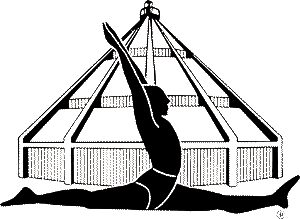We’re run as a charity, overseen by a board of trustees
Iyengar Yoga London is overseen by our trustee board which is responsible for safeguarding the centre’s assets, representing members and ensuring we deliver on our charitable objectives. Our current Iyengar Yoga London trustees are:
Chair: Giorgio Ambrosetti
Treasurer: Sidharth Punshi
Richard Agar Ward (Teacher)
Pamela Golden
Peter Hahn
Kristyan Robinson (Teacher)
Andrew Wainstein
Lucie Winter
Iyengar Yoga London was set up in 1984 by Iyengar yoga teachers including B.K.S. Iyengar, to provide students with an ideal space to study and practise yoga in London. Many teachers dedicating their time and money to founding the centre included BKS Iyengar, who held a conference at the Barbican in 1984 and contributed the proceeds to the building fund. He visited the site numerous times to stay and teach, and held the organisation’s official opening ceremony in 1997.
Today, you can find Iyengar yoga institutes and teachers around the world, but at the time it was built, Iyengar Yoga London was the first purpose built yoga studio in Europe. In addition to our regular members and students, we have visitors come from around the world to consult our archive and see the site that was Iyengar’s home in the UK.
Role of the board
B.K.S. Iyengar died in 2014 and his influence as a master yoga teacher is widely recognised. Our centre is dedicated to maintaining his legacy by providing a centre of excellence offering classes, research, outreach teaching, support and training for Iyengar yoga students and teachers. As a board, Iyengar Yoga London trustees represent the centre’s members in our aim to maintain the financial foundations of the organisation so that it can deliver on its charitable objectives; to advance public education, support study and practice, and to publish and research.
We are an affiliated organisation of IY (UK), the body responsible for maintaining standards of teaching of Iyengar yoga in the UK, and our Teaching Committee consults directly with with RIMYI, the Institute set up by B.K.S.Iyengar in Pune on questions relating to teaching.
A membership charity
As a membership charity our members are represented by an elected board of Iyengar Yoga London trustees, made up of students and teachers who volunteer their time to help oversee the management of the centre. The chair of the board of trustees directly oversees the centre’s manager who in turn looks after our team.
The teaching committee is a voluntary group of our teachers who meet to make recommendations to the board of trustees on decisions relating to teaching. They are closely involved in maintaining standards of teaching and professional development to serve our community of members. There is a teachers’ representative on the board of trustees and the chair of the teaching committee also sits on the board.
Annual general meeting
All of our annual members are welcome to attend and vote at our AGM where there is a review of the financial performance from the previous year. Plans for the upcoming year are discussed and feedback from attendees is gathered and recorded to be fed into the board of trustees’ meetings.
Board vacancies
Iyengar Yoga London trustees serve for three years. We ask annual members to put themselves forward when vacancies on the board come up and ask that board members have been members of the centre for a minimum of one year. Once a name is put forward, the proposed trustee must be nominated by the board. If you have expertise you think could be helpful in the management of the charity then please feel free to contact us with details of your experience and interest in getting involved and we will hold your details on file until there is a vacancy.
Becoming an Iyengar Yoga London trustee
Trustees are annual members who voluntarily undertake responsibility for the strategic direction of the organisation, and for ensuring that it fulfils its legal and charitable obligations. They are elected at the AGM to serve for a period of 3 years. Trustees are also appointed as directors of the company during their period of office.
1. Why should I become a trustee?
Trustees represent the whole membership from entirely new students to the most experienced teachers. They consider strategy and take decisions on how the organisation is run, subject to the powers invested in them by the articles of association.
In taking responsibility for running a charity and a company, trustees accept obligations to fulfil the objects of the charity on behalf of its members in providing a public benefit. We depend upon this voluntary activity to maintain and improve a healthy and vibrant organisation so, if you have benefited from your experience of Iyengar yoga at the centre, we hope that you will consider contributing to its future.
Your contribution may take many forms and may be based on your:
- business or academic experience,
- financial acumen,
- experience in Iyengar yoga,
- interest in the building or design,
- desire to expand the range of classes, courses or workshops we offer,
- wish to promote research,
- and any other skills or experience that may help to improve the work of the organisation and promote it to a wider public.
By becoming a trustee, you can support the work of the charity and make changes for the better. You should be independent minded but also prepared to act together with your fellow trustees for the benefit of all members.
2. Am I eligible?
Potential trustees must be over 18 and have been annual members of the centre for a period of at least one year before becoming eligible to serve as a trustee. They must not be persons who are disqualified from holding office.
3. What do trustees do?
Trustees meet regularly to discuss the business of the organisation, to review its activities and to make decisions on how it should operate to fulfil its stated purposes (the objects) on behalf of the members. They act collectively and have a wide range of powers which are set out in the articles of association. All potential trustees receive a copy of the articles along with other training, support and guidance. Trustees are ultimately responsible for ensuring that the organisation fulfils its legal and charitable obligations and are protected from personal liability so long as they act within their powers and in good faith.
4. What don’t they do?
The role of trustees is strategic, so they are not required to perform the day-to-day administrative and managerial functions of the organisation. These are delegated to one or more paid employees with specific contracts of employment. However, trustees are legally responsible for the work of the charity. The chair has the additional responsibility of acting as line-manager to the manager.
5. What experience is necessary?
There is no formal qualification for becoming a trustee save for being an annual member of at least one year’s standing. However, you should have the time and energy to devote to the responsibilities involved. We seek to achieve a balance of experience within the board. This may be in business (for example: finance, marketing or advertising, human resources, IT, governance) or other charitable work. Your involvement and interest in our classes is taken as given.
6. How often do they meet?
The trustees have board meeting every 6-8 weeks throughout the year. They may arrange additional meetings to discuss specific matters as the need arises and may establish sub-committees to discuss specialised areas of activity and to report to the main board.
Board meetings usually last 2-2½ hours and are held at times arranged to suit as many trustees as possible.
Sub-committees set their own agendas consistent with the tasks allocated to them by the board. Currently there are three sub-committees, each chaired by a member of the main board.
7. How many trustees are there?
A maximum of 12 members may be elected. Usually there are about 8 including a chair and honorary treasurer, elected by the trustees from among their number. By convention two teacher members serve on the board.
8.What guidance is available to me?
Trustees are required to take part in an induction process with the chair and manager and, on election, to sign a copy of the trustees’ code of conduct which sets out the principles of service.
The Charity Commission produces a wide range of additional information for the guidance of charitable trustees. Copies of essential documents are provided to all potential trustees. The principal guide for individual trustees is The Essential Trustee (CC3).
9. How do I apply to become a trustee?
You may apply by sending an email or letter to the office, or by calling into the office for further information. The manager will be able to provide you with all the information and documentation you may require in deciding to put yourself forward.
10. How does the election process work?
Potential trustees are nominated by the board of trustees at the AGM, usually held in June, and must be elected by a majority of the annual members present and eligible to vote at the meeting.
- Trustees serve for three years from the meeting at which they are elected.
- Automatic retirement occurs at the third AGM after election.
- Previous trustees may be re-elected after a break of one year.
For further information or an informal chat, please call Alan Reynolds on +44 20 7624 3080 or send an email to office@iyengaryogalondon.co.uk with ‘Trusteeship’ in the subject line, and we will get back to you.
Teaching Committee
The teaching committee represents the interests of our teachers. Teachers serve on the teaching committee for a term of three years and meet regularly to discuss timetabling, teaching, yoga facilities and Iyengar yoga best practice at the centre in order to make recommendations to the board of trustees. The teaching committee plays a vital role in the organisation with its focus on maintaining the high teaching standards that have been part of Iyengar Yoga London since it opened.
If you are an Iyengar Yoga London teacher and would like to get involved in the teaching committee or would like to feed back any comments relating to the timetable, facililties, and your experience as a teacher, please email office@iyengaryogalondon.co.uk.
Teachers
The teaching committee oversees the roster of teachers and cover teachers at the centre. If you are a qualified Iyengar yoga teacher and would like to be considered to teach at the centre please send your CV to us at office@iyengaryogalondon.co.uk.
Registered details
Registered charity number: 1092322
Company No: 4431832
Registered Office: 223a Randolph Avenue, Maida Vale, London W9 1NL





